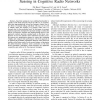Free Online Productivity Tools
i2Speak
i2Symbol
i2OCR
iTex2Img
iWeb2Print
iWeb2Shot
i2Type
iPdf2Split
iPdf2Merge
i2Bopomofo
i2Arabic
i2Style
i2Image
i2PDF
iLatex2Rtf
Sci2ools
117
click to vote
GLOBECOM
2007
IEEE
2007
IEEE
An Optimal Strategy for Cooperative Spectrum Sensing in Cognitive Radio Networks
— Spectrum sensing is a key enabling functionality in cognitive radio (CR) networks, where the CRs act as secondary users that opportunistically access free frequency bands. Due to the effects of channel fading, individual CRs may not be able to reliably detect the existence of a primary radio, who is a licensed user for the particular band. In this paper, we present optimal cooperation strategies for spectrum sensing to combat the effects of destructive channels and malfunctioning devices. Our approach conducts spectrum sensing based on the linear combination of local test statistics from individual secondary users. We propose two optimization schemes to control the combining weights, and compare their performance. Our first approach is to optimize the probability distribution function of the global test statistics at the fusion center. For the second scheme, we maximize the global detection sensitivity under constraints on the false alarm probability. Simulation results illustrate...
Related Content
| Added | 02 Jun 2010 |
| Updated | 02 Jun 2010 |
| Type | Conference |
| Year | 2007 |
| Where | GLOBECOM |
| Authors | Zhi Quan, Shuguang Cui, Ali H. Sayed |
Comments (0)

